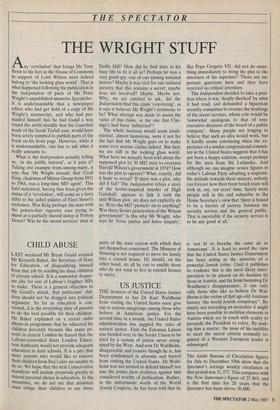THE SPECTATOR
THE WRIGHT STUFF
What is the IndePendent actually telling us, 'in the public interest', as it puts it? Taking one example from among many, it says that `Mr Wright reveals' that 'Cecil King, chairman of Mirror Group from 1951 to 1968, was a long-time MIS agent'. This bald statement, having thus been given the status of a 'revelation', will come as a tasty titbit to the jaded palates of Fleet Street's molemen. Was King perhaps the man with the poison-dart cigarette case trying to shoot at a partially shaved sheep at Porton Down? Was he the secret services' man at Dollis Hill? How did he find time in his busy life to fit it all in? Perhaps he was a very good spy: one of our unsung national heroes? Maybe it was vital for our national security that this remains a secret; maybe lives are involved? Maybe. Maybe not. Why, we are entitled to ask, did the Independent find this claim 'convincing', as it says it believes Mr Wright's testimony to be? What attempt was made to assess the value of this claim, or the one that Clar- idge's had been 'infiltrated'?
The whole business would seem insub- stantial, almost humorous, were it not for the fact that Mr Wright goes on to make some very serious claims indeed. But here we are still in the looking glass world. What have we actually been told about the supposed plot by 30 M15 men to. overturn Harold Wilson's government in 1974? How was the plot to operate? What, exactly, did it hope to reveal? If there was a plot, why did it fail? The Independent relays a story of the Soviet-inspired murder of High Gaitskell, appears to link it with the anti-Wilson plot, yet does not explicitly do so. Were the MIS 'plotters' on to anything? Was there Soviet penetration of the Wilson government? Is this why Mr Wright, who says he 'loves justice and hates iniquity', like Pope Gregory VII, did not do some- thing immediately to bring the plot to the attention of his superiors? There are im- portant questions here and they have received no critical attention, The Independent decided to take a posi- tion where it was 'deeply shocked' by what it had read; and deinanded a bipartisan security committee to oversee the workings of the secret services, whose role would be `somewhat analogous to that of non- executive directors of the board of a public company', Many people are longing to believe that such an idea would work, but it hardly seems convincing when the ex- perience of a similar congressional commit- tee in the United States suggests that it has not been a happy solution, except perhaps for the men from the Lubianka. And although we can imagine senior figures in today's Labour Party adopting a responsi- ble attitude towards these matters, nobody can foresee how their front bench team will look in, say, ten years' time. Surely more people will in the end subscribe to the Home Secretary's view that 'there is bound to be a barrier of secrecy between the security service and the general public. That is inevitable if the security service is to be any good at all.'


















































 Previous page
Previous page